

Now in its third year, Life in the UK is beginning to offer a longer-term story of what life is like for people in the UK and in each of its devolved jurisdictions.
- Democracy
- Economy
- Environment
- Evidence and reports
- Inequality
- Measuring wellbeing
- Society
- Carnegie UK
- 2 November 2025
- ISBN: 9978-1-917536-06-6
- 12 minute read
Collective wellbeing in Wales 2025
The overall score for collective wellbeing in Wales in 2025 is 62 out of a possible 100. This is the same as in 2024 and 2023. While there have been small fluctuations in domain level scores, these changes are not statistically significantly different from previous years.
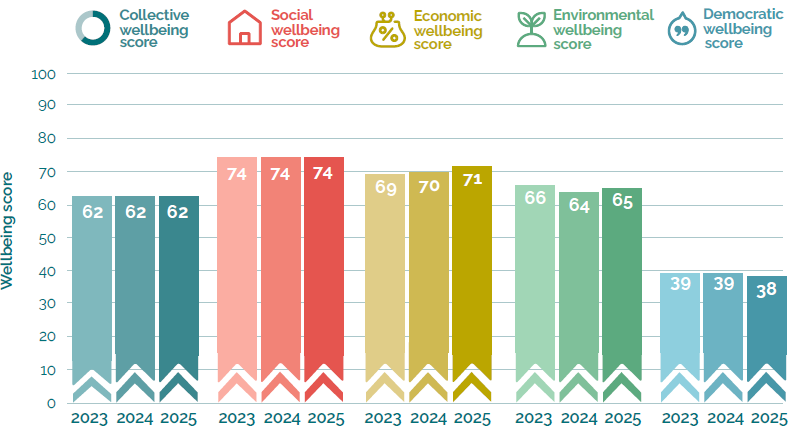
Understanding what influences collective wellbeing
The collective wellbeing score for people in Wales is once again stagnant: there has been no improvement or decline since Life in the UK first reported in 2023.
The factors that are associated with especially wide gaps in collective wellbeing reflect those found in previous years.
In 2025 the following three factors stand out in predicting a lower or higher collective wellbeing score:
- Being disabled is strongly associated with lower collective wellbeing: Disabled people have a collective wellbeing score of 55, 10 points lower than for those without a disability.
- As area deprivation worsens, collective wellbeing decreases: People living in the least deprived areas have a collective wellbeing score of 67, 13 points higher than for those living in the most deprived areas.
- Having a household income of below £26,000 per year lowers collective wellbeing: People with an annual household income of below £26,000 have a collective wellbeing score of 56, eight points lower than for those with a household income of between £26,000 and £51,999. Those with a household income of £52,000 or more have a collective wellbeing score of 66.
Disability and income were both key predictors of collective wellbeing in 2024. This year, living in the least deprived areas also has a notable effect.
However, in 2025 some factors have a weaker pull on someone’s wellbeing than seen previously, including age and whether someone lives in a rural or urban area. Both factors are not currently predictors of someone’s collective wellbeing score according to our data.
Collective wellbeing map
Social wellbeing is about everyone being able to achieve their potential and contribute to society because they have their basic needs met. Our basic needs include having access to health and social care, education, housing, transport, digital resources and childcare.
To determine trends in social wellbeing across the UK, we asked questions about access to public services, community relationships, safety and community cohesion, and self-reported health and mental health.
The people most likely to experience high levels of social wellbeing in Wales in 2025 are:
- People over the age of 55, who have a social wellbeing score of 78. This is eight points higher than for those aged 16 to 34.
- People with a household income of between £26,000 and £51,999, whose social wellbeing score is 77. This is nine points higher than for those whose household income is below £26,000.
- Men, who have a social wellbeing score of 76. This is three points higher than for women.
In contrast, the people who are likely to experience low levels of social wellbeing in Wales in 2025 are:
- Disabled people, who have a social wellbeing score of 63. This is 16 points lower than for those who are not disabled.
- People who rent from a private landlord, who have a social wellbeing score of 69. This is nine points lower than for homeowners.
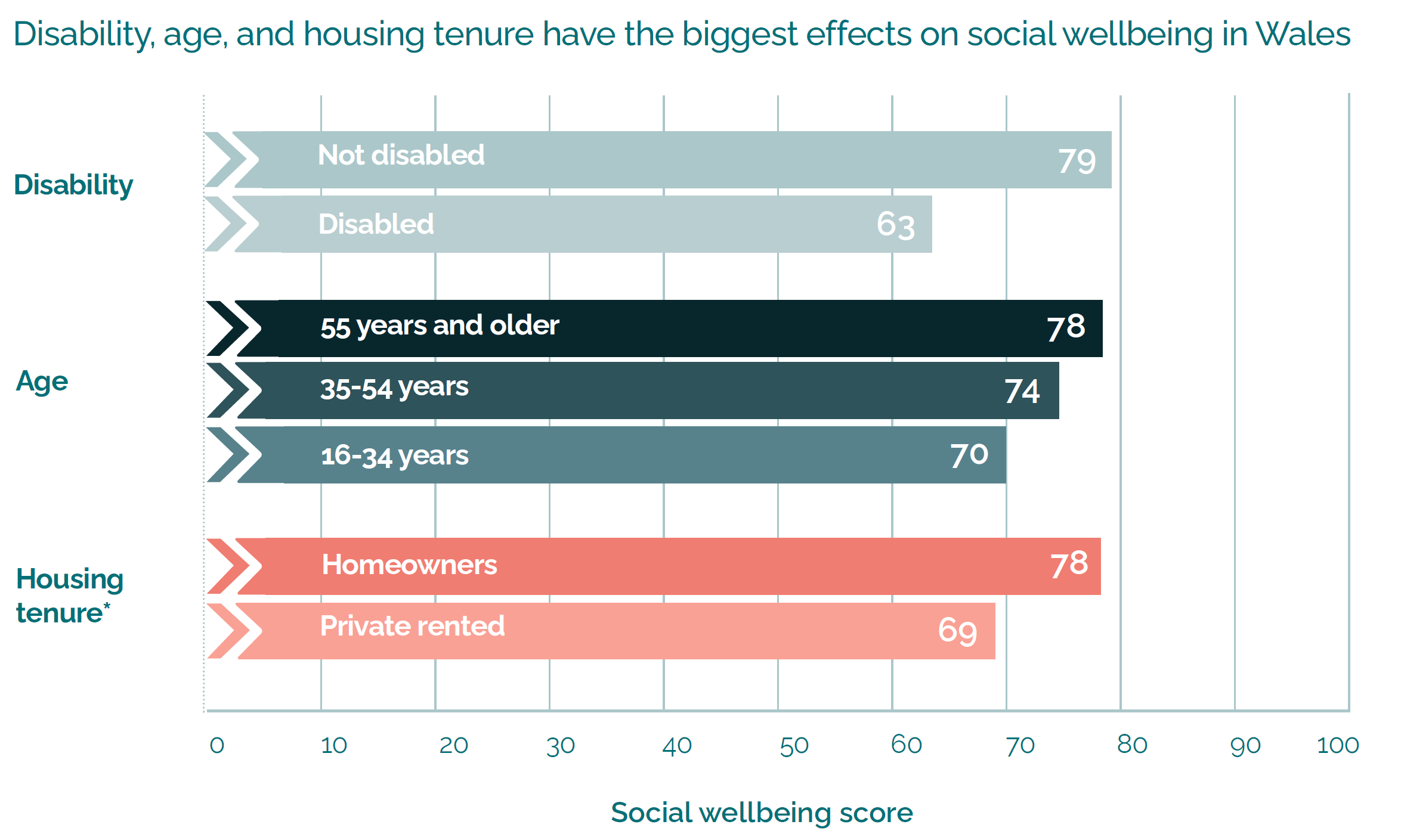
Social wellbeing – standout statistics
Social wellbeing in Wales is higher than the UK average but remains stagnant.
- 77% of people feel safe walking alone in their local neighbourhood after dark, higher than the UK average of 71%.
- 38% of people experienced discrimination in the last year, six percentage points lower than the UK average.
- 32% of people find it difficult to access public transport that can get them where they need to go, significantly higher than the UK average of 19%.
Social wellbeing summary
The social wellbeing of people in Wales has remained the same across all three years of Life in the UK to date, and it remains higher than the UK average.
While the social wellbeing of people in Wales has not changed for better or worse, some groups of people are facing worse scores than in previous years. Being disabled and being a private tenant continue to have a strong negative impact on social wellbeing scores, while earning over £26,000 is associated with higher social wellbeing. Men in Wales are also now more likely to have higher social wellbeing than women.
Although some aspects of social wellbeing are better for people in Wales than the UK average, people in Wales are more likely to find it difficult to access public transport that can get them where they need to go: nearly one in three (32%) say that this is hard.
In the UK as a whole people were more likely to say they are in good general health in 2025, but this is not the case in Wales. Likewise, although the number of people feeling in good mental health improved in the UK as a whole, this was also not seen in Wales. While in the UK overall people were more likely to experience discrimination in 2025 than in 2024, this has not been reflected in Wales. However, nearly two in five (38%) people in Wales still experienced discrimination in the last year.
Economic wellbeing in Wales 2025
Wales scores 71 out of a possible 100 for economic wellbeing.
Economic wellbeing means that everyone has a decent minimum living standard and can absorb financial shocks. This includes access to a decent income, job opportunities and skills as well as ensuring essential aspects of life are affordable and households have financial resilience.
To determine trends in economic wellbeing across Wales, we asked questions about skills and job availability, and the affordability of essential items like food and fuel.
The people most likely to experience high economic wellbeing in Wales in 2025 are:
People with an annual household income of £52,000 to £99,999, who have an economic wellbeing score of 79. This is 18 points higher than for those with an annual household income of below £26,000. Those with an annual household income of between £26,000 and £51,999 have an economic wellbeing score of 73.
In contrast, the people who are likely to experience low economic wellbeing in Wales in 2025 are:
- Disabled people, who have an economic wellbeing score of 60. This is 15 points lower than for those without a disability.
- People aged between 35 and 54, who have an economic wellbeing score of 68. This is six points lower than for those aged 55 or over.
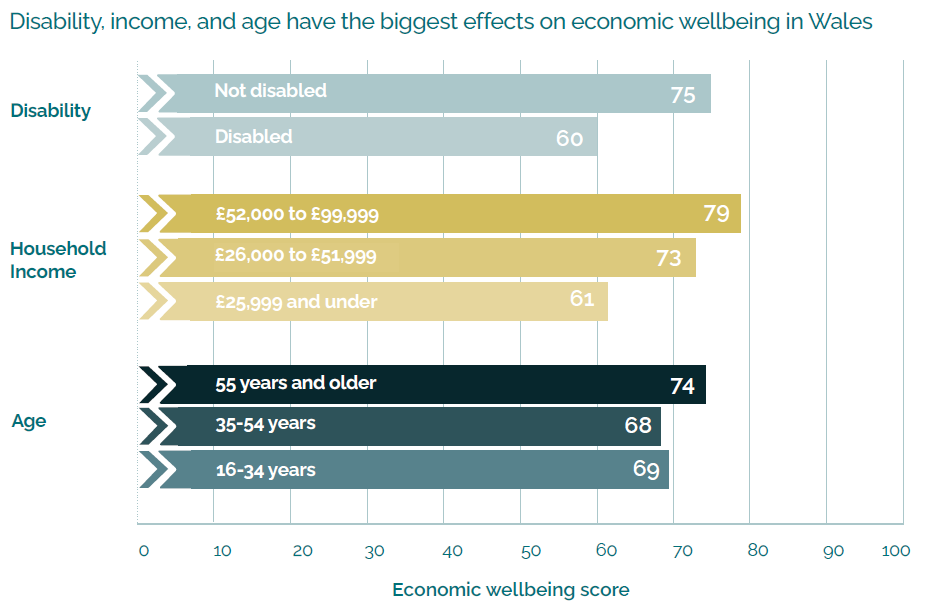
Economic wellbeing – standout statistics
Economic wellbeing has been stagnant in Wales since 2023, despite improvements in other parts of the UK.
- 79% of people can afford to keep their home adequately warm, including in the winter months, similar to previous years.
- 65% of people can afford to pay a necessary but unexpected expense of £850, similar to previous years.
- 38% of people are dissatisfied with the availability of job opportunities in their
local area. This is higher than the UK average of 32%.
Economic wellbeing summary
Overall, the economic wellbeing of people in Wales has remained stable over time.
Like in the rest of the UK, just under four in five (79%) of people agreed that they could afford to heat their home to an adequate standard, including in the winter, though the improvement has been smaller in Wales than in the UK overall.
Other than household income levels, no other group stands out as having better economic wellbeing than the average in Wales. However, disability status and age do have a negative impact on economic wellbeing – continuing to entrench existing inequalities relating to these groups of people.
There are small signs in some areas that suggest greater equality this year, but certain groups are being left further behind, especially disabled people and people below the age of 55. Addressing these imbalances is vital in order to create a Wales where everyone has access to a decent minimum living standard and meaningful opportunities.
Environmental wellbeing in Wales 2025
Wales scores 65 out of a possible 100 for environmental wellbeing.
Environmental wellbeing means that everyone has access to green and blue spaces and collectively we live within the planet’s natural resources, protecting the environment for future generations.
To determine trends in environmental wellbeing across Wales, we asked questions about access to and the quality of local parks, rivers and other green and blue spaces, and about noise pollution, air pollution, and litter in local areas. We also asked about levels of satisfaction with efforts to preserve the environment.
The people most likely to experience high environmental wellbeing in Wales in 2025 are:
- People who are over 55 years old, who have an environmental wellbeing score of 69. This is eight points higher than for 16 to 34-year-olds.
In contrast, the people who are likely to experience low environmental wellbeing in Wales in 2025 are:
- People in the most deprived areas, who have an environmental wellbeing score of 54. This is 16 points lower than for those in the least deprived areas.
- People in urban areas, who have an environmental wellbeing score of 62. This is nine points lower than for those in urban areas.
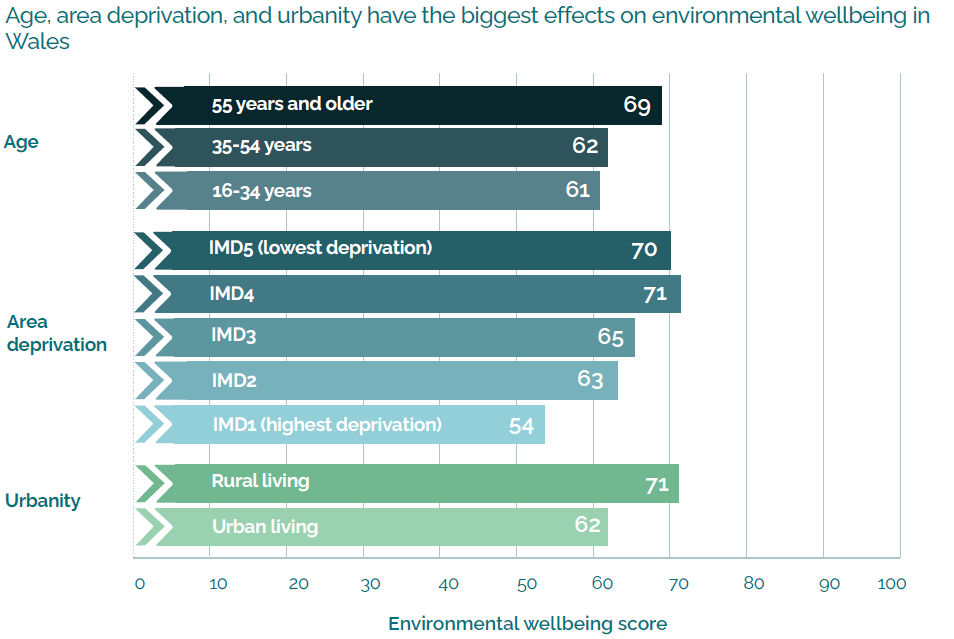
Environmental wellbeing –
standout statistics
There were no major changes to people’s experiences of local environmental problems, but people in Wales were less likely than in 2024 to be satisfied with efforts to preserve the environment in the UK.
- 71% of people are satisfied with the quality of their local public, green, or open space, similar to previous years.
- 57% experienced problems with noise, seven percentage points lower than the UK overall result.
- 47% experienced problems with air quality. This is lower than for people in England but higher than for people in Scotland and Northern Ireland.
- 23% of people are happy with efforts to preserve the environment in the UK, seven percentage points lower than in 2024.
Environmental wellbeing summary
People in Wales have a higher environmental wellbeing score than in the UK overall and, in contrast to the rest of the UK, Wales has not seen an increase since 2023 in the number of people who experience problematic noise pollution and litter. However, people’s circumstances still have a notable impact on their environmental wellbeing.
Place plays a key role in environmental wellbeing in Wales. Living in an urban area continues to predict a lower environmental wellbeing score. In addition, area deprivation also has a big impact on environmental wellbeing: people in the least deprived areas have a higher environmental wellbeing score than in 2024 while those in the most deprived areas have a score two points lower than in 2024.
As in previous years, being aged over 55 years old has a positive impact on environmental wellbeing. However, generally people in Wales are not satisfied with efforts to preserve the environment. In 2024 30% of people in Wales were satisfied with efforts to preserve the environment by the UK Government, but in 2025 this has dropped to 23%. This is the reverse of the pattern seen in the UK as a whole, where fewer people were dissatisfied in 2025 than in 2024.
Democratic wellbeing in Wales 2025
Wales scores 38 out of a possible 100 for democratic wellbeing.
Democratic wellbeing is about everyone having a voice in decisions made that affect them. This means having local and
national leaders who support participation, foster trust, and encourage diversity.
To understand democratic wellbeing in Wales in 2025, we asked questions about levels of trust in local, regional and national government(s), perceptions of personal ability to influence decisions.
Although very low for all groups, the people most likely to experience low democratic wellbeing in Wales in 2025 are:
- Disabled people, who have a democratic wellbeing score of 33. This is seven points lower than for those without a disability.
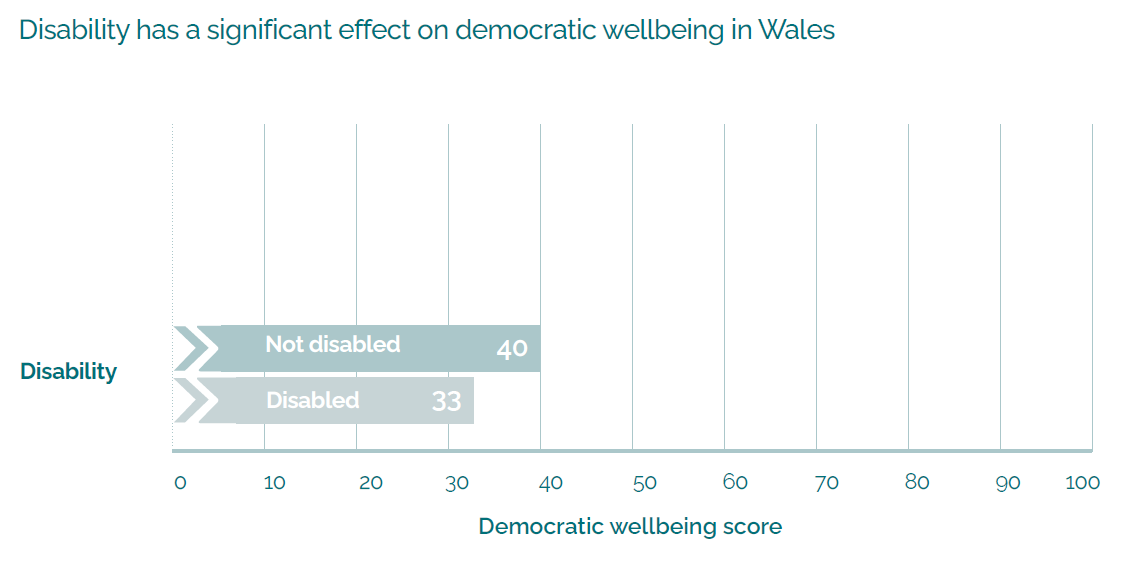
Democratic wellbeing – standout statistics
Trust in the UK Government is stagnant, but trust in other institutions and the devolved government is declining.
- 67% of people have low trust in social media, 11 percentage points higher than in 2023, 45% have low trust in big tech, nine percentage points higher than in 2023.
- 53% of people have low trust in the UK Government. This is similar to previous years, but higher than the UK average of 45%.
- 43% of people have low trust in the Welsh Government, seven percentage points higher than in 2023.
- Just 6% of people feel that they can influence decisions affecting the UK, four percentage points higher than in 2023, while 8% feel that they can influence decisions affecting Wales.
Democratic wellbeing summary
The democratic wellbeing of people in Wales is unchanged from previous years and remains of real concern. While there has been an improvement in democratic wellbeing in the UK as a whole, this has not been reflected in Wales.
In Wales, people have less trust in the UK government than people across the UK as a whole. Indeed, this level has remained the same over time whereas in the UK overall this has improved since last year. Further, trust in the devolved government has declined: people in Wales are now more likely to have low trust in the Welsh Government and in the Senedd members than they were in 2023.
Although people in Wales are a little more likely to feel they can influence decisions affecting the UK than in 2023, they are no more likely to feel that they can influence decisions affecting Wales. In addition, more than one in three people (36%) have low trust in local councils, significantly higher than the UK overall result of 29%.
Our research suggests that while views towards UK wide institutions have remained relatively stable, trust in devolved democracy in Wales has declined on multiple levels and is alarmingly low.
Like in the rest of the UK, trust in big tech companies and social media is lower than in previous years.
Many of the demographic factors affecting other domains have less of a direct impact on democratic wellbeing. However, someone’s disability status, as in other collective wellbeing domain scores, does have a significant impact
Get in touch
Want to chat about Life in the UK 2025 Wales? Get in touch with Susan.
Help us make the case for wellbeing policy
Keep in touch with Carnegie UK’s research and activities. Learn more about ways to get involved with our work.
"*" indicates required fields

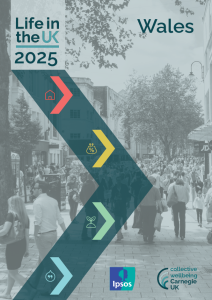
Social wellbeing in Wales 2025
Wales scores 74 out of a possible 100 for social wellbeing.